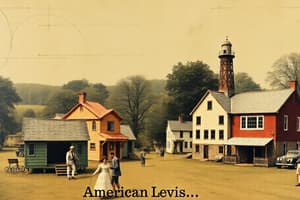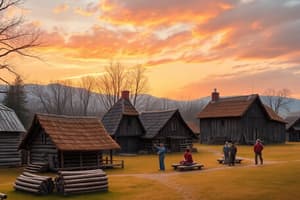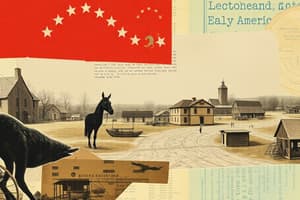Podcast
Questions and Answers
The first permanent European settlement in the New World was ______.
The first permanent European settlement in the New World was ______.
St. Augustine
What was the name of the colony founded by Sir Walter Raleigh, known today as "The Lost Colony"?
What was the name of the colony founded by Sir Walter Raleigh, known today as "The Lost Colony"?
Roanoke
What nation did England defeat in 1588?
What nation did England defeat in 1588?
Spanish
In what year was Jamestown founded?
In what year was Jamestown founded?
Where did the Separatists, seeking religious freedom, first move to?
Where did the Separatists, seeking religious freedom, first move to?
In what year did the Pilgrims establish their colony at Plymouth?
In what year did the Pilgrims establish their colony at Plymouth?
What was the name of the first written agreement of self-government in America?
What was the name of the first written agreement of self-government in America?
What was the name of the act passed in Massachusetts in 1647 that established the first public schools in America?
What was the name of the act passed in Massachusetts in 1647 that established the first public schools in America?
What was the name of the first written constitution in America?
What was the name of the first written constitution in America?
What was the name of Colonial Virginia’s elected body of representatives?
What was the name of Colonial Virginia’s elected body of representatives?
What were the names of the three ships that brought settlers to Jamestown?
What were the names of the three ships that brought settlers to Jamestown?
Who was the first Indian to welcome the Pilgrims?
Who was the first Indian to welcome the Pilgrims?
What was the name of Georgia’s first permanent settlement?
What was the name of Georgia’s first permanent settlement?
What was the name of the first royal colony owned by the King of England?
What was the name of the first royal colony owned by the King of England?
What was the name of South Carolina’s first permanent settlement?
What was the name of South Carolina’s first permanent settlement?
In 1699, what city became the capital of Virginia?
In 1699, what city became the capital of Virginia?
Who requested American land from the King of England to establish a colony for English Catholics?
Who requested American land from the King of England to establish a colony for English Catholics?
What two ships brought settlers to Maryland seeking religious freedom?
What two ships brought settlers to Maryland seeking religious freedom?
The name of the colony that is now the state of New York was New ______.
The name of the colony that is now the state of New York was New ______.
Who was the Dutch governor of New Netherland who was forced to surrender to the English?
Who was the Dutch governor of New Netherland who was forced to surrender to the English?
What were the Swedes who settled in Delaware the first to build?
What were the Swedes who settled in Delaware the first to build?
What was the proper name for the Quakers?
What was the proper name for the Quakers?
Who was responsible for establishing a settlement at Philadelphia?
Who was responsible for establishing a settlement at Philadelphia?
Who was the leader of the Moravians, a group active in missionary work?
Who was the leader of the Moravians, a group active in missionary work?
Who was the Indian who lived with the Pilgrims and helped them to survive?
Who was the Indian who lived with the Pilgrims and helped them to survive?
Who claimed part of North America for England in 1497?
Who claimed part of North America for England in 1497?
Who was one of the first missionaries spurred by the Great Awakening?
Who was one of the first missionaries spurred by the Great Awakening?
Who was the first governor of Jamestown?
Who was the first governor of Jamestown?
Who was the minister of the colony at Plymouth?
Who was the minister of the colony at Plymouth?
Who was the second governor of Plymouth and the author of Of Plymouth Plantation?
Who was the second governor of Plymouth and the author of Of Plymouth Plantation?
Who founded the first colony to offer complete religious freedom in America?
Who founded the first colony to offer complete religious freedom in America?
Who was the Connecticut-born preacher who was one of the first leaders in the Great Awakening?
Who was the Connecticut-born preacher who was one of the first leaders in the Great Awakening?
Who preached throughout the colonies, sometimes to 20,000 people at once, and was an English evangelist?
Who preached throughout the colonies, sometimes to 20,000 people at once, and was an English evangelist?
Who was the America’s first black woman writer to have a book published?
Who was the America’s first black woman writer to have a book published?
Who was hired to protect the Pilgrims at Plymouth?
Who was hired to protect the Pilgrims at Plymouth?
Who planned and directed the building of the first Georgian settlement?
Who planned and directed the building of the first Georgian settlement?
Who married Pocahontas?
Who married Pocahontas?
Explain how some of the widespread ideas during the Great Awakening affected the American colonies and led to a desire for liberty and the War for Independence. Include at least 5 important facts.
Explain how some of the widespread ideas during the Great Awakening affected the American colonies and led to a desire for liberty and the War for Independence. Include at least 5 important facts.
Flashcards
First permanent European settlement
First permanent European settlement
St. Augustine
Lost Colony
Lost Colony
Roanoke
Defeated Armada in 1588
Defeated Armada in 1588
Spanish
Year Jamestown was founded
Year Jamestown was founded
Signup and view all the flashcards
First place Separatists moved
First place Separatists moved
Signup and view all the flashcards
Pilgrims' colony establishment year
Pilgrims' colony establishment year
Signup and view all the flashcards
First self-government agreement
First self-government agreement
Signup and view all the flashcards
First public schools law
First public schools law
Signup and view all the flashcards
First written constitution
First written constitution
Signup and view all the flashcards
Virginia's elected representatives body
Virginia's elected representatives body
Signup and view all the flashcards
Ships that brought settlers to Jamestown
Ships that brought settlers to Jamestown
Signup and view all the flashcards
First Indian to welcome Pilgrims
First Indian to welcome Pilgrims
Signup and view all the flashcards
Georgia's first permanent settlement
Georgia's first permanent settlement
Signup and view all the flashcards
First royal colony
First royal colony
Signup and view all the flashcards
South Carolina's first settlement
South Carolina's first settlement
Signup and view all the flashcards
Virginia's capital in 1699
Virginia's capital in 1699
Signup and view all the flashcards
Colony for English Catholics
Colony for English Catholics
Signup and view all the flashcards
The Ark and the Dove
The Ark and the Dove
Signup and view all the flashcards
State now known as New York
State now known as New York
Signup and view all the flashcards
Dutch governor of New Netherland
Dutch governor of New Netherland
Signup and view all the flashcards
Swedes in Delaware built
Swedes in Delaware built
Signup and view all the flashcards
Society of Friends
Society of Friends
Signup and view all the flashcards
Founder of Philadelphia
Founder of Philadelphia
Signup and view all the flashcards
Leader of Moravians
Leader of Moravians
Signup and view all the flashcards
Indian who helped Pilgrims survive
Indian who helped Pilgrims survive
Signup and view all the flashcards
Claimed North America for England
Claimed North America for England
Signup and view all the flashcards
First Great Awakening missionary
First Great Awakening missionary
Signup and view all the flashcards
First Jamestown governor
First Jamestown governor
Signup and view all the flashcards
Plymouth minister
Plymouth minister
Signup and view all the flashcards
Second Plymouth governor
Second Plymouth governor
Signup and view all the flashcards
Founded colony for religious freedom
Founded colony for religious freedom
Signup and view all the flashcards
Leader in the Great Awakening
Leader in the Great Awakening
Signup and view all the flashcards
English evangelist in colonies
English evangelist in colonies
Signup and view all the flashcards
First black woman writer
First black woman writer
Signup and view all the flashcards
Protected Pilgrims at Plymouth
Protected Pilgrims at Plymouth
Signup and view all the flashcards
James Oglethorpe's role
James Oglethorpe's role
Signup and view all the flashcards
Married Pocahontas
Married Pocahontas
Signup and view all the flashcards
Study Notes
Early American Settlements and Figures
- St. Augustine was the first permanent European settlement in the New World.
- Roanoke, founded by Sir Walter Raleigh, is known as the "Lost Colony."
- England defeated the Spanish Armada in 1588.
- Jamestown was founded in 1607.
- The Separatists initially went to Holland for religious freedom.
- The Pilgrims established Plymouth in 1620.
- The Mayflower Compact was the first written agreement of self-government.
- Massachusetts established the first public schools in 1647 with the Ole' Deluder Satan Act
- The Fundamental Orders of Connecticut was America's first written constitution.
- Virginia's elected representatives were called the House of Burgesses.
- The Susan Constant, Godspeed, and Discovery brought settlers to Jamestown.
- Samoset was the first Native American to welcome the Pilgrims.
- Savannah was Georgia's first permanent settlement.
- Virginia was England's first royal colony.
- Charleston was South Carolina's first permanent settlement.
- Williamsburg became Virginia's capital in 1699.
- Maryland was established for English Catholics by Lord Baltimore.
- The Ark and the Dove brought settlers to Maryland seeking religious freedom.
- New Netherland was the original name for the colony that is now New York .
- Peter Stuyvesant, the Dutch governor of New Netherland, surrendered to the English.
- Swedes in Delaware were the first to build log cabins.
- The Quakers were also known as the Society of Friends.
- William Penn established Philadelphia.
- The Moravians, led by Count von Zinzendorf, were active missionaries.
- Squanto helped the Pilgrims survive.
- John Cabot claimed part of North America for England in 1497.
- David Brainerd was an early missionary.
- Lord De La Warr was the first governor of Jamestown.
Colonial Leaders and Events
- Elder Brewster was a minister at Plymouth.
- William Bradford was the second governor of Plymouth and wrote Of Plymouth Plantation.
- Roger Williams founded a colony offering religious freedom.
- Jonathan Edwards was a preacher of the Great Awakening.
- George Whitefield was a widely-known evangelist of the Great Awakening.
- Phillis Wheatley was America's first black woman writer to publish a book.
- Captain Myles Standish protected the Pilgrims at Plymouth.
- James Oglethorpe planned and directed the building of Savannah.
- John Rolfe was married to Pocahontas.
The Great Awakening's Impact
- The Great Awakening fostered a sense of equality among colonists.
- This sense of equality, expressed in the Declaration of Independence, influenced a desire for liberty.
- The Great Awakening unified colonists by creating a common identity.
- The Great Awakening fueled missionary work and emphasized the dignity of labor.
- Biblical principles during the Great Awakening impacted various aspects of colonial life.
Studying That Suits You
Use AI to generate personalized quizzes and flashcards to suit your learning preferences.




